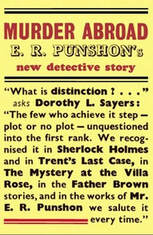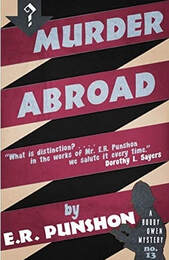
With little authority and not overly optimistic, Bobby arrives to find the mill already inhabited by an unfriendly English couple named Williams. But the prime suspect is a young man named Charles Camion, who had a row with Miss Polthwaite the night she went missing. Talking with the villagers adds some details to the picture: the murdered woman appeared to be afraid of someone or something; there was bad blood between Camion and a boxing hopeful named Volny, who might have been competing for Miss Polthwaite’s favor and finances; and a few of the rough diamonds have shown up at the base of the shrine to the Black Virgin, despite the curé’s efforts to conceal the fact from Bobby.
As the traveling detective states it at the end of the first chapter, Owen’s mission is threefold: “the diamonds, the murderer, the truth.” If he can uncover one or more, the same Lady Markham who pulled strings to get him a month’s leave from the force will advance Bobby to a private secretaryship for a chief constable. (One neat detail about Punshon’s series is that Bobby rises in the ranks as his successes and hard work are rewarded through promotions. He is introduced as a rookie Police-Constable in 1933’s inaugural Information Received; eleven adventures later, Owen is now a Detective-Sergeant building up enough career security so he can wed his hat-maker love interest, Olive Farrar.) The fact that Owen is a visitor in France and that his English policeman’s status means nothing offers an interesting twist. As he remarks midway through the mystery, ordinarily he would report his findings to his superior and let those above him decide how best to activate the investigative machine and take the next steps. Alone on the hills and plateaus of Auvergne Bobby can’t rely on a group decision, and each action must be taken by him as a free – and often vulnerable – agent and outsider.
E.R. Punshon’s stories can sometimes feel overwritten and underpaced, resulting in tedium when readers find themselves ahead of the author and his detective. But Murder Abroad delivers one of Punshon’s best tales. It is not so much because the crime puzzle baffles, although the scenario of a spinster thrown into a well generates a haunting sense of the harshness of nature enhanced by the rocky, rough Massif setting. For me, it is largely the lack of divisional police trappings that makes the investigation here more immediate and intriguing than in previous stories such as The Mystery of Mr. Jessop (1937). By Chapter Two, Bobby is in the village and flying solo, and so there are no over-the-desk office conversations with a Superintendent Mitchell type to summarize points and decide what “bears looking into.” Punshon gives his detective a Watson of sorts in the form of Père Trouché, a pontificating blind beggar whose pride and acute sense of hearing help Bobby make connections among the villagers he might otherwise have missed.
I found the stranger-in-a-strange-land aspect of Murder Abroad very effective. While the book’s prose and dialogue are presented almost exclusively in English, we are offered enough evidence of idioms and translations to be reminded that Bobby Owen is conversing in the natives’ language. (One example: the English policeman uses the word assassin when referring to Miss Polthwaite’s unknown killer, a term reflective of the French word for murdered, assassiné.) Bobby himself feels out of place and unfamiliar with the local customs and social psychology of these people. “At home,” writes Punshon, “in England, in London especially, [Bobby] would have been able to place them all much more easily and to form on them a judgment much more likely to be accurate.”

The excellent Dean Street Press has returned to print and eBook E.R. Punshon’s elusive mysteries, so fans of classic mystery fiction can access them affordably once more (or discover them for the first time). The Goodreads group Reading the Detectives is currently moving through the Bobby Owen series, and this month’s selection coincided with my own Punshon progress, as I had read up to Murder Abroad. I’m glad I made the journey. And this Detective-Sergeant seems to be going places.
 RSS Feed
RSS Feed